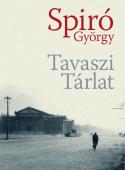
SPRING COLLECTION (TAVASZI TÁRLAT) -

„Never before have we seen depicted with such force the horrible everyday life of the fifties, the breakdown and the compromises of the individual, and the process of a whole society giving up it’s integrity.”
“It’s not a bad idea for a man to get admitted to hospital a couple of days before a revolution breaks out, stay in until it’s been quashed and recuperate quietly at home during the ensuing purge.” These are the opening lines of György Spiró’s latest novel, Spring Collection, that presents the reader with a shocking picture of the 56 Hungarian Revolution. The main protagonist is an engineer by the name of Gyula Fátray who, like so many other qualified professionals at that time, is trying to get along first as a simple worker before the Second World War, and after it as a communist party member, an idealist, and leader of planning in a newly founded factory. Just days before mass protests begin in October, he is admitted to hospital for an operation for haemorrhoids. He returns home after the fighting to be faced by a Soviet-occupied Budapest.
This novel commemorates the unbearably absurd machinations of the dictatorial regime in which not even those innocent could feel safe. When Gyula’s name appears in a newspaper article alongside some conspirators against the state, he finds himself ostracised by his best friends and closest colleagues virtually overnight. It no longer seems to matter that he was in hospital for the duration of the revolution and that the charges are false. Just as in Kafka’s Trial, history marches mercilessly towards an excruciating outcome.
Gyula’s situation is made all the more difficult by the fact that his wife, Kati, a tough communist, seems not to understand a thing because she is so wrapped up in herself and her role in organising an art installation known as the Spring Collection.
This novel recalls the purges that came after 56 with touching authenticity. At the end, on May 1st of 1957 the whole nation, the majority of which had revolted against the system half a year earlier, submitted to the new communist leadership that did not understand that Hungary had been defeated for decades. Our hero’s life hangs by a single thread, and there is a special twist in the story that makes it possible for him to survive. The false charge and ensuing expulsion from society mark the beginning of the process which eventually led to the trial and execution of Imre Nagy. The impossibility of family life provides a dramatic parallel to the historical parody of a failed, conquered country and it is from this double story that one of György Spiró’s most exciting novels is born.
Rights sold:
(status on may 2013)
Spanish (Acantilado)
Catalan (Quaderns Crema)
Italian (Guanda)
Finnish (Avain)
German language (Nischen Verlag)
Slovak (Kalligram)
Bulgarian (Gutenberg Publishing)
Turkish (Dedalus Publishing)
GYÖRGY SPIRÓ was born in 1946 in Budapest. He is a writer, a dramatist and a translator and scholar of Polish literature. He is one of the most frequently played contemporary playwrights of Hungary.
*********************
Osoby zainteresowane tytułem oraz innymi dziełami G. Spiró prosimy o kontakt z Justyną Czechowską pod adresem justyna@literatura.com.pl
(dostępny maszynopis oraz inne materiały recenzenckie)
